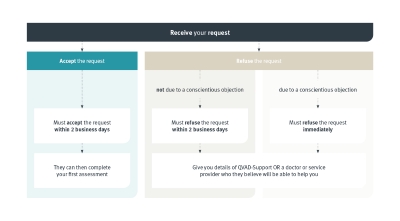Request and assessment—Voluntary assisted dying process
First request
Only you can make a request for voluntary assisted dying, your family and carers cannot request voluntary assisted dying on your behalf.
You ask a doctor for access to voluntary assisted dying. This is the first of 3 requests.
The request must be:
- clear and unambiguous, so your doctor knows exactly what you are asking
- made by yourself and not by another person on your behalf
- made verbally or by other means of communication such as gestures.
If you choose to start the voluntary assisted dying process, you should make your request to your doctor during a medical consultation. This can be in person or via telehealth.
Not all doctors provide voluntary assisted dying services, but all doctors have legal obligations.
The Voluntary Assisted Dying Act 2021 (the Act) states that if a doctor chooses not to be involved, they must give you information about other doctors or services who may be able to help you access voluntary assisted dying. A doctor can refuse your request if they:
- have a conscientious objection—this is the right to refuse to provide voluntary assisted dying due to personal reasons or beliefs
- don’t have the appropriate skills or training to accept the first request
- will not be available to help the person through the process–for example, they will be on leave.
If the reason for refusing the first request is a conscientious objection, the doctor must immediately inform you of this reason. Otherwise, the doctor must inform you of their acceptance or refusal within 2 business days after the first request is made.
If the doctor accepts the first request, they become your coordinating practitioner (coordinating doctor) and must give you the approved voluntary assisted dying first request information. The coordinating doctor supports you through the process. To be a coordinating doctor a doctor must meet eligibility criteria and have completed the mandatory training.


In this guide:


